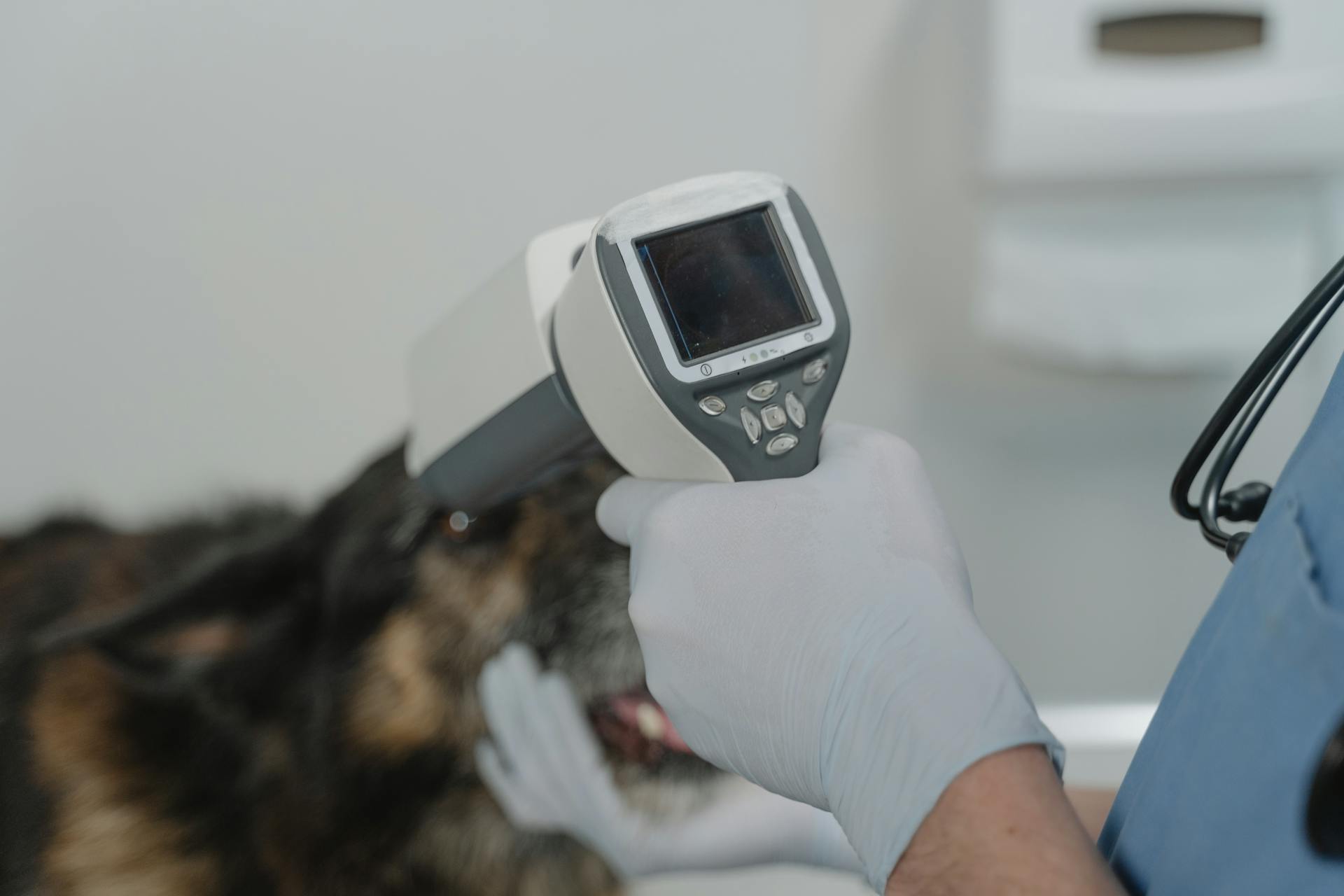
The larynx, also known as the voice box, is an organ in the throat that helps to produce sound. The larynx is made up of many different muscles, which work together to open and close the vocal cords. Laryngeal paralysis is a condition that occurs when the muscles of the larynx are unable to work properly. This can lead to problems with speaking, swallowing, and breathing.
Laryngeal paralysis is a relatively rare condition, but it can be caused by a variety of factors. In some cases, the condition is present at birth (congenital laryngeal paralysis). In other cases, laryngeal paralysis may be the result of an injury or illness. For example, the condition can occur after a surgery on the larynx, or it may be the result of a neurological disorder such as ALS (amyotrophic lateral sclerosis).
Laryngeal paralysis can cause a number of different symptoms. These may include hoarseness, breathlessness, and a feeling of something stuck in the throat. In severe cases, laryngeal paralysis can lead to complete loss of voice (aphonia). Difficulty swallowing (dysphagia) and aspiration pneumonia are also potential complications of the condition.
There is no cure for laryngeal paralysis, but there are some treatments that can help to improve symptoms. In some cases,speech therapy may be recommended. Surgery is also an option for some people, although it is not always successful. Other treatments that may be helpful include voice training, breathing exercises, and the use of a prosthesis (artificial device) to help with swallowing.
Laryngeal paralysis can be a debilitating condition, but there are many ways to manage it. With appropriate treatment and support, many people with laryngeal paralysis are able to live normal, active lives.
Worth a look: What to Feed a Dog with Laryngeal Paralysis
What are the symptoms of laryngeal paralysis in dogs?
When a dog has laryngeal paralysis, it means that the animal's vocal cords are not able to move properly. This can result in a change in the dog's bark, as well as other respiratory problems.
Signs that your dog may have laryngeal paralysis include:
• A change in the dog's bark. This may sound raspy, hoarse, or unlike the dog's normal bark.
• Exercise intolerance. Dogs with laryngeal paralysis may tire easily and have difficulty catching their breath.
• Straining to breathe. Dogs with laryngeal paralysis may make grunting or gasping noises when they inhale.
• Difficulty eating. If the paralysis affects the opening of the dog's mouth, it may have trouble eating or picking up food.
• Collapsing. In severe cases, laryngeal paralysis can cause a dog to faint or collapse due to lack of oxygen.
If your dog is showing any of these signs, it's important to take it to the vet for an evaluation. Laryngeal paralysis is a serious condition that can be life-threatening, so early diagnosis and treatment is essential.
See what others are reading: Canine Laryngeal Paralysis Non-surgical Treatment
What causes laryngeal paralysis in dogs?
Laryngeal paralysis is a condition that can affect dogs of any age, gender, or breed. The condition is caused by a failure of the nerves that control the muscles of the larynx (voice box) to function properly. This results in the paralysis of the muscles of the larynx, which can lead to difficulty breathing, a change in the pitch of the dog's voice, and in some cases, complete loss of the ability to bark.
There are many possible causes of laryngeal paralysis, including:
• Trauma to the nerves of the larynx: This can occur due to physical trauma, such as being hit by a car, or from surgical trauma, such as during a tracheotomy.
• Congenital defects: Some dogs are born with defects in the nerves of the larynx, which can lead to laryngeal paralysis.
• Tumors: Tumors of the larynx or of the nerves that control the larynx can lead to laryngeal paralysis.
• Infections: Infections of the larynx or of the nerves that control the larynx can lead to laryngeal paralysis.
• Metabolic diseases: Some metabolic diseases, such as hypothyroidism, can lead to laryngeal paralysis.
The most common symptom of laryngeal paralysis is a change in the dog's bark. The bark may sound muffled or breathy, and in some cases, the dog may completely lose the ability to bark. Other symptoms of laryngeal paralysis include:
• Difficulty breathing: The paralysis of the muscles of the larynx can make it difficult for the dog to breathe, especially when exercising or during periods of hot weather.
• Exercise intolerance: Due to the difficulty breathing, dogs with laryngeal paralysis may become tired quickly during exercise and may need to stop and rest frequently.
• Change in voice: The paralysis of the larynx muscles can cause the pitch of the dog's voice to change.
If your dog shows any of these symptoms, it is important to take them to see a veterinarian as soon as possible. Laryngeal paralysis can be a serious condition and can lead to respiratory failure and death if left untreated.
There are several diagnostic tests that can be used to diagnose laryngeal paralysis,
Explore further: Laryngeal Paralysis and Hind End Weakness
How is laryngeal paralysis diagnosed in dogs?
Laryngeal paralysis is diagnosed through a series of steps that includes taking a history, performing a physical examination and often times implementing diagnostic imaging. The veterinarian will ask the pet owner questions about the onset of the signs, any possible trauma and the dog’s response to exercise. A physical examination will be performed next and often times a stethoscope will be used to auscultate the larynx for abnormalities. If the veterinarian suspects laryngeal paralysis, he or she will likely recommend diagnostic imaging such as fluoroscopy or endoscopy. Fluoroscopy is an x-ray of the larynx that is performed while the dog is under general anesthesia and is the best way to assess the cartilage that makes up the larynx. Endoscopy is also performed under general anesthesia and allows the veterinarian to visualize the inside of the larynx and look for any areas of paralysis. After the diagnostic imaging is performed, the veterinarian will discuss treatment options with the pet owner.
What are the treatment options for laryngeal paralysis in dogs?
Laryngeal paralysis is a condition that affects the muscles of the larynx, or voice box. The larynx is responsible for opening and closing the airway, as well as producing sound. When the muscles of the larynx are paralyzed, the airway is not able to open and close properly, and the dog may have difficulty breathing and making sounds.
There are two main types of laryngeal paralysis: unilateral and bilateral. Unilateral paralysis affects only one side of the larynx, while bilateral paralysis affects both sides. Laryngeal paralysis can be caused by a number of things, including neurological conditions, injuries, and certain diseases.
There are several treatment options available for dogs with laryngeal paralysis. The type of treatment will depend on the severity of the paralysis and the underlying cause. Mild cases of laryngeal paralysis may not require any treatment at all. For more severe cases, treatment options may include:
- Surgery: Surgery is the most common treatment for laryngeal paralysis. The goal of surgery is to improve the dog's ability to breathe by opening up the airway. There are several different types of surgical procedures that can be used, and the type of surgery will be determined by the veterinarian based on the individual dog's case.
- Voice rest: For dogs that have laryngeal paralysis caused by an injury or disease, voice rest may be recommended. This means that the dog should not be allowed to bark or make any other noise for a period of time. This will allow the muscles of the larynx to heal and may improve the dog's ability to breathe.
- Therapy: There are several different types of therapies that can be used to help dogs with laryngeal paralysis. These include speech therapy, physical therapy, and occupational therapy. The type of therapy will be determined by the veterinarian based on the individual dog's needs.
- Medications: There are a variety of medications that can be used to help dogs with laryngeal paralysis. These include corticosteroids, antibiotics, and anticholinergics. The type of medication will be determined by the veterinarian based on the individual dog's needs.
Laryngeal paralysis can be a serious condition, but there are many treatment options available. If your dog has been diagnosed with laryngeal paralysis, be sure to work closely with your veterinarian
Can cbd oil help dogs with laryngeal paralysis?
Laryngeal paralysis is a debilitating condition that can significantly impact a dog's quality of life. While there is no cure for this condition, there are treatments available that can help improve a dog's symptoms and overall prognosis. One such treatment is the use of cbd oil.
Cbd oil is derived from the cannabis plant and contains a variety of compounds, including cannabidiol (cbd). Cbd oil has been shown to have a variety of health benefits in humans, including the treatment of anxiety, pain, and inflammation. Preliminary research also suggests that cbd oil may be beneficial in the treatment of other conditions, such as epilepsy and cancer.
While the research on cbd oil and its potential health benefits is still in its early stages, there is some promising evidence that suggests it may be effective in the treatment of laryngeal paralysis. One study showed that cbd oil was able to significantly improve symptoms in dogs with laryngeal paralysis. The dogs in the study were given cbd oil for eight weeks and then assessed for their symptoms. The results showed that the majority of dogs that were given cbd oil experienced a significant improvement in their symptoms, with many dogs becoming symptom-free.
While the research on cbd oil and laryngeal paralysis is still in its early stages, the preliminary evidence is promising. If you are considering using cbd oil to treat your dog's laryngeal paralysis, speak with your veterinarian first to ensure that it is the right treatment option for your dog.
What are the side effects of cbd oil for dogs with laryngeal paralysis?
There are not many definitive studies on the side effects of CBD oil for dogs with laryngeal paralysis. However, there are some potential side effects that owners should be aware of. The most common potential side effects include:
1. Dry mouth: CBD oil can decrease saliva production, which can lead to dry mouth.
2. Low blood pressure: CBD oil can cause a temporary drop in blood pressure. This can lead to lightheadedness and dizziness.
3. Drowsiness: CBD oil can cause drowsiness, especially when given in high doses.
4. GI problems: CBD oil can cause upset stomach, diarrhea, and other gastrointestinal issues.
5. Liver toxicity: CBD oil can potentially cause liver toxicity.
6. Interactions with other medications: CBD oil can interact with other medications, including certain antidepressants, blood thinners, and pain medications.
7. Allergic reactions: Some dogs may be allergic to CBD oil. Signs of an allergic reaction include itchiness, hives, and swelling of the face, lips, or tongue.
8. Increased anxiety: CBD oil can increase anxiety levels in some dogs.
9. Increased aggression: CBD oil can increase aggression in some dogs.
10. Skin reactions: CBD oil can cause skin reactions in some dogs, including irritation, redness, and bumps.
If you are considering giving your dog CBD oil, it is important to speak with your veterinarian first. They can help you determine the appropriate dose and help you watch for any potential side effects.
Expand your knowledge: Can Fleas Cause Paralysis in Cats?
How often should cbd oil be given to dogs with laryngeal paralysis?
Laryngeal paralysis is a condition that can cause dogs to have difficulty breathing. The larynx is the organ in the throat that helps to control the movement of air into and out of the lungs. When the muscles that control the larynx are paralyzed, the airway can become obstructed, making it hard for the dog to breathe.
There is no one answer to the question of how often cbd oil should be given to a dog with laryngeal paralysis. The frequency will depend on the severity of the condition and the response to treatment. For example, if the paralysis is mild and the dog is only showing occasional signs of difficulty breathing, the cbd oil may only need to be given on an as-needed basis. However, if the paralysis is more severe and the dog is having difficulty breathing regularly, the cbd oil may need to be given more frequently, possibly even daily.
In general, it is best to start with a small dose of cbd oil and increase the frequency as needed. If the cbd oil is effective, the dog should start to show improvement within a few days to a week. If there is no improvement, or if the condition worsens, it is important to consult with a veterinarian to determine the best course of treatment.
Are there any other natural treatments that can help dogs with laryngeal paralysis?
There are numerous natural treatments that can help dogs with laryngeal paralysis. Some of the most popular and effective treatments include acupuncture, herbs, and essential oils.
Acupuncture is a form of Traditional Chinese Medicine that has been used to treat a variety of ailments for centuries. It involves the insertion of thin needles into specific points on the body. Studies have shown that acupuncture can be helpful in reducing inflammation and promoting healing. Herbs have also been used for centuries to treat a variety of ailments. There are numerous herbs that can be helpful in treating laryngeal paralysis, including echinacea, goldenseal, and licorice root. Essential oils are also a popular natural treatment for a variety of ailments. Some of the most popular essential oils for laryngeal paralysis include lavender oil, tea tree oil, and rosemary oil.
While there are numerous natural treatments that can be helpful in treating laryngeal paralysis, it is important to consult with a qualified healthcare professional before starting any new treatment.
Frequently Asked Questions
What are the causes of laryngeal paralysis?
Laryngeal paralysis can be caused by damage to the vagus nerve or to recurrent laryngeal nerves.
What is laryngeal paralysis in dogs?
Laryngeal paralysis is a condition in which the nerves that control the voice and breathing are not working correctly. This can occur either because of a congenital problem or as a result of an injury, such as a tumour. Laryngeal paralysis can be very serious, and if it’s not treated quickly it can lead to death. The larynx is located behind your throat and consists of two smaller organs known as the epiglottis and the thyroid cartilage. These structures help to trap air when you breathe in and protect your vocal cords from becoming damaged. The recurrent laryngeal nerve (RLN) travels through your neck on its way down to your chest. When there’s damage to this nerve, it can cause problems with speech and breathing. The RLN is usually injured by trauma, such as a tumour or stroke, but it can also be affected by other conditions, such as laryngeal
What is idiopathic laryngeal paralysis?
Idiopathic laryngeal paralysis is a condition that affects the nerves of the larynx (the voice box). It's usually a result of a condition affecting the nerves of the larynx, called bilateral mononeuropathy of the recurrent laryngeal nerves. This damage can cause weakness in your vocal cords and difficulty speaking or swallowing. There is no one specific cause of idiopathic laryngeal paralysis, but it's often caused by an autoimmune disorder, including lupus erythematosus and Sjögren's syndrome. Idiopathic laryngeal paralysis can also be caused by head and neck cancer, viral polio contraction, and other less common causes.
What is vocal cord paralysis?
Vocal cord paralysis is a condition in which the nerve impulses to your voice box (larynx) are disrupted. This results in paralysis of the vocal cord muscles. The vocal cords are the two thin pieces of muscle that hang down from your Adam's apple and help you produce sound. When these nerves are damaged, it can't send the correct signals to the muscles, which causes them to go completely stiff. This makes it difficult for you to speak or sing.
How does nerve paralysis cause larynx paralysis?
The cause of nerve paralysis is unknown, but it is thought to be related to damage to the nerves themselves (either from a prior illness or injury, or as a result of the ALS disease). Once the nerves are damaged, they become incapable of sending signals to the muscles in the body that control vocalization. This can lead to laryngeal paralysis.
Sources
- https://www.pethealthandnutritioncenter.com/collections/laryngeal-paralysis-dogs
- https://www.hillspet.com/dog-care/healthcare/laryngeal-paralysis-in-dogs
- https://dogdiscoveries.com/health/natural-treatment-for-laryngeal-paralysis-in-dogs
- https://cannanine.com/can-cbd-oil-help-my-dogs-collapsing-trachea-educational-guide/
- https://kosu.globalcz.eu/
- https://wikidoggia.com/post/how-to-help-a-dog-with-laryngeal-paralysis
- https://dogendorsed.com/side-effects-of-cbd-oil-for-dogs/
- https://charitypaws.com/laryngeal-paralysis-in-dogs-when-to-euthanize/
- https://petkeen.com/side-effects-of-cbd-oil-for-dogs/
- https://dvsc.com/2020/04/laryngeal-paralysis-dogs/
- https://stressaffect.com/what-is-laryngeal-paralysis-how-can-cbd-oil-help-dogs-with-lp/
- https://worlddogfinder.com/blog/dog-health/laryngeal-paralysis-in-dogs
- https://www.thecbdoilbenefits.com/can-cbd-oil-help-my-dog-with-laryngeal-paralysis-year/
- https://eatcbdgummies.com/cbd-oils/can-cbd-help-with-laryngitis-symptoms/
Featured Images: pexels.com


